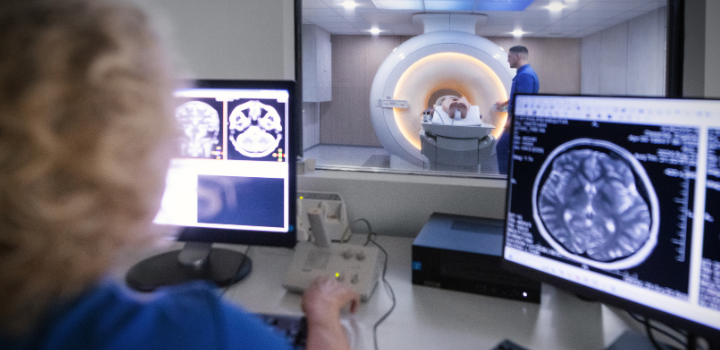Handing out vapes in A&E helps smokers quit
By: Communications

Giving out free e-cigarette starter packs in hospital emergency departments to people who smoke helps more people quit – according to research from the University of East Anglia.
The trial, funded by the National Institute for Health and Care Research (NIHR), offered advice, an e-cigarette starter pack and referral to stop smoking services to people attending A&E for any reason, to help them to stop smoking.
Six months later, almost one in four people given the starter packs said they had quit smoking. And those who received the packs but didn’t quit altogether, were more likely to have reduced the number of cigarettes they smoked.
The trial, which was run by the Norwich Clinical Trials Unit at UEA, took place across six UK hospitals, and the research team now hope that the initiative will be rolled out to hospitals nation-wide.
Dr Ian Pope, from UEA’s Norwich Medical School and an emergency physician, said: “Emergency departments in England see more than 24 million people each year of whom around a quarter are current smokers.
“Attending the emergency department offers a valuable opportunity for people to be supported to quit smoking, which will improve their chances of recovery from whatever has brought them to hospital, and also prevent future illness.
“Smoking killed almost 75,000 people in the UK in 2019 and it is the leading cause of preventable death and disease in the UK.
“Swapping to e-cigarettes could save thousands of lives. We believe that if this intervention was widely implemented it could result in more than 22,000 extra people quitting smoking each year.”
Trial co-lead Prof Caitlin Notley, also from UEA’s Norwich Medical School, said: “Many people who smoke want to quit, but find it difficult to succeed in the long term.
“Electronic cigarettes mimic the experience of cigarette smoking because they are hand-held and generate a smoke-like vapour when used. They can be an attractive option for helping people switch from smoking, even if they have tried and failed in the past.
“We know that they are much less harmful than smoking tobacco, and that they have been shown to help smokers quit.
“About half of all people who smoke will die prematurely, losing on average 10 years of life, and for every death caused by smoking, approximately 30 more people are suffering from a smoking-related disease.
“Smoking-related cancers, respiratory and cardiovascular diseases severely impact people’s quality of life as they get older and are a huge cost burden for the NHS.”
The study, co-designed and managed with the help of Norwich Clinical Trials Unit, ran over 30 months across six hospitals in England and Scotland – at the Norfolk and Norwich University Hospital, the Royal London Hospital and Homerton University Hospital in London, Leicester Royal Infirmary, Addenbrooke’s hospital in Cambridge and the Royal Infirmary of Edinburgh.
A total of 972 people who smoked who agreed to take part were randomly assigned to receive either smoking advice, an e-cigarette starter pack and referral to local stop smoking services - or just ‘usual care’ written information about locally available stop smoking services.
Both groups of patients were asked if they were still smoking one, three and six months after they attended hospital. Those who reported quitting after six months were asked to undergo a carbon monoxide breath test.
Dr Pope said: “Those recruited were from neighbourhoods with high levels of deprivation and more people were unemployed or unable to work due to sickness or disability than the average.
“23.4 per cent of the vape intervention group reported having quit smoking six months after they attended the emergency department, compared to 12.9 per cent of the usual care group. This shows that people were twice as likely to quit smoking having received the intervention than not.
“7.2 per cent of those in the vape intervention group and 4.1 per cent of those in usual care group were confirmed to have quit smoking by undergoing a carbon monoxide breath test1.
“We also found that people who had received the vape intervention but did not quit smoking were more likely to reduce the number of cigarettes they smoked and more likely to have tried to quit compared to the usual care group.
“This shows that helping people quit smoking whilst they wait in the emergency department is effective.
“It also shows that the emergency department offers a chance to reach people who may not otherwise be motivated to quit, or who might not have the knowledge or resources to access stop smoking services.
“It also confirms that e-cigarettes are effective at helping people to quit smoking,” he added.
“Based on these results we feel hospital emergency departments are a valuable opportunity to support people to quit smoking and policy makers should seriously consider it as a location for smoking cessation interventions.”
This research was led by UEA and the Norfolk and Norwich University Hospital in collaboration with the University of York, the University of Leicester, the University of Edinburgh, University Hospitals of Leicester NHS Trust, Barts NHS Trust, Cambridge University Hospitals Foundation Trust, NHS Lothian, Homerton University Hospital NHS Trust, and Nuffield Department of Primary Care Health Sciences.
‘Cessation of Smoking Trial in the Emergency Department (COSTED): a multi-centre, randomised controlled trial’ is published in the Emergency Medicine Journal.
As this was only a trial, people who smoke are reminded that A&E departments are not currently handing out free vapes. Help to stop smoking is available at https://www.nhs.uk/better-health/quit-smoking/
Related Articles

UEA launches study after supplement shows promise in professional racing drivers
Researchers at the University of East Anglia (UEA) are launching a new study to see whether American ginseng extract could boost brain health.
Read more
UEA to receive share of £15 million funding boost for region
University of East Anglia researchers have been awarded a share of £15.3 million to tackle real-world health and care challenges across the region and beyond.
Read more
MRI scan breakthrough could spare thousands of heart patients from risky invasive tests
Doctors may soon be able to tell just how sick a heart failure patient really is by using a routine MRI scan, thanks to new research from the University of East Anglia (UEA).
Read more